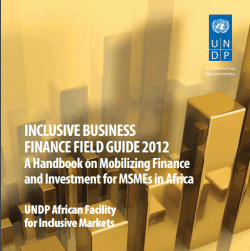
Policy highlights:
- Inclusive business finance (IBF) refers to funding and other forms of capital that support the creation, growth and sustainability of entrepreneurs and smallholders, micro-, small- and medium-sized enterprises (MSMEs) that were previously excluded from financial markets. Instruments include: debt, equity, quasi-equity, grants, insurance, guarantees, development finance and shared risk instruments and mechanisms.
- Companies can capture growth opportunities while supporting economic development within low income communities by providing intermediation for MSMEs within their value chain. In particular, the ‘missing middle’ represents a major gap in the financing pool and represents a significant opportunity for finance providers willing to support entities that are too large for micro-credit and too small for commercial credit from banks.
- For development practitioners, an understanding of the segmented inclusive and business finance marketplace, along with insight into how to access and attract this capital for the benefit of low-income community development programmes, will both increase the effectiveness of aid resources and improve economic growth sustainability and inclusiveness in developing countries.










